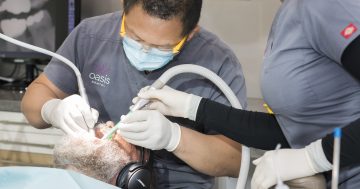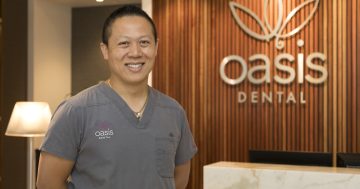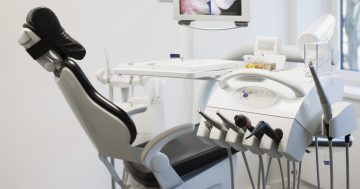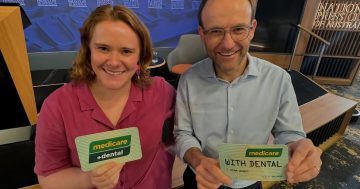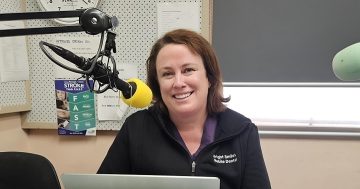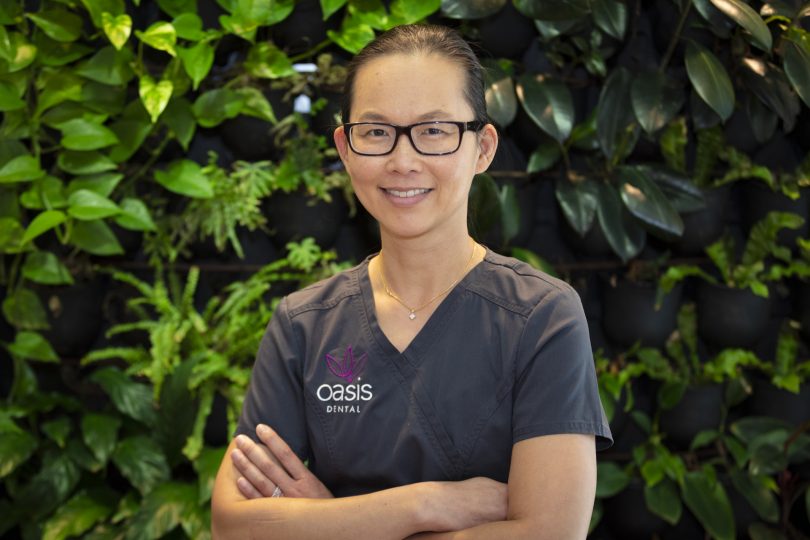
A mum of three, Dr Jeanine Lee takes the time to build trust with her younger patients at Oasis Dental in Kingston. Photo: Thomas Lucraft.
Most dental-phobic adults will relate to a bad childhood dental experience.
Dr Jeanine Lee from Oasis Dental in Kingston says a traumatic dental visit as a child may make someone afraid of dentists for the rest of their lives.
“If dental health hasn’t been prioritised throughout childhood, and parents haven’t set those habits in place, there can be a lot of consequences and irreversible damage down the track,” she says.
“What we don’t want to see in young adults is reactionary dentistry, when they only come back when they’re in pain.”
Dr Jeanine recommends parents never bring their child to the dentist for the first time as an emergency.
“They’re likely to need treatment in an unfamiliar environment and are often already presenting in an emotional state and in pain – that will never end well,” she says.
Dr Jeanine explains that when it comes to children’s dental health, prevention is everything.
“When this has failed, early intervention is the next best option,” she says.
Poor childhood dental habits always translate into problems in adults.
In the worst scenario, an early loss of deciduous teeth – also known as baby teeth – from decay almost always results in orthodontic crowding and the need for braces later in life.
Dr Jeanine says it’s crucial for parents to make visiting their dentist “normal and positive” from a young age.
She says in the long run, taking children for regular hygiene and examinations is far cheaper than complex treatment required under general anaesthetic. Consideration also must be given to the risks associated with the drugs used for general anaesthetics.
Dr Jeanine advises parents to educate themselves on how to help their children set up good oral health and habits they can apply to themselves, too.
If possible, parents should try to find a dentist who can do the work under local anaesthetic.
“This takes time, patience, clinical skill and a desire to treat children not as second-class people with just baby teeth that will eventually fall out,” says Dr Jeanine.

Dr Jeanine Lee, from Oasis Dental, says when it comes to children’s dental health, prevention is everything. Photo: Thomas Lucraft.
The single biggest factor contributing to the condition of adult teeth is the health of baby teeth.
While parents always want the best for their children, Dr Jeanine says they often don’t make the connection that a child ‘discount’ at some dental practices most likely means the treatment has been compromised in some way.
She says cheap, fast dental procedures can have terrible consequences.
“At Oasis, we stress that the outcome is always the most important factor, and this is why we do not position ourselves as the cheapest dentist, but rather a next-level dental practice where the outcome is everything,” says Dr Jeanine.
Some dentists don’t want to treat children, and when they do, they can often adopt a mentality of ‘it’s only baby teeth’. This usually results in restorations that are not as good.
Often dental treatment is postponed in children until the severity requires referral to a paediatric dentist or treatment under general anaesthetic.
Dr Jeanine has worked as a dentist for 20 years after graduating from the University of Sydney with first-class honours and the prestigious University Medal.
She now practices with her husband, Dr Rick Luu, at Oasis Dental, which they own and operate.
Being the owners of the practice with no associate dentists means Dr Jeanine and Dr Rick are able to maintain the highest level of clinical expectations and outcomes, and also means they have limited clinical capacity and seek patients who value long-term clinical outcomes above all else.
To learn more about the services offered, visit Oasis Dental.
This is a sponsored article, though all opinions are the author’s own. For more information on paid content, see our sponsored content policy.












